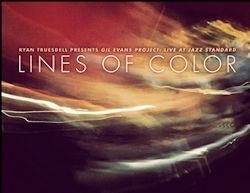1. Time of the Barracudas
2. Davenport Blues
3. Avalon Town
4. Concorde
5. Can't We Talk It Over
6. Gypsy Jump
7. Greensleeves
8. Easy Living Medley
9. Just One of Those Things
10. Sunday Drivin'
11. How High the Moon
Ryan Truesdell - Conductor
Jesse Han, Jessica Aura Taskov, Steve Kenyon, Steve Wilson, Dave Pietro, Donny McCaslin, Scott Robinson, Brian Landrus, Tom Christensen, Aldan Banta -
Woodwind
Augie Haas, Greg Gisbert, Mat Jodrell - Trumpets
Adam Unsworth, David Peel - French Horns
Ryan Keberle, Marshall Gilkes - Trombones
George Flynn - Bass trombone
James Chirillo - Guitar
Frank Kimbrough - Piano
Jay Anderson - Bass
Lewis Nash - Drums
Wendy Gilles- Voice (tracks 5, 8 and 10)
Lois Martin - Viola (track 4)
So who is Ryan Truesdell and what is his connection to the legend that was Gil Evans? Truesdell hails from New England and studied jazz composition with
the late, great Bob Brookmeyer. He has composed pieces for large and small ensembles and also works as a music copyist for Maria Schneider. The
Brookmeyer/Schneider connections brought him in touch with Gil Evans's son, Miles. Working with the Evans family, Truesdell unearthed some of Gil's
lesser-known arrangements including some that were never recorded. A resulting CD, `Centennial', was highly-praised (and rightly so) in the jazz press and
received a 2013 Grammy nomination for Best Large Jazz Ensemble. Since I've been a Gil Evans admirer for several decades, it's a real pleasure to review
this second CD which was recorded live at the Jazz Standard in New York in 2014.
The band, which is generally 25-strong, includes several musicians who perform regularly in Maria Schneider's orchestra (due to play at the London Jazz
Festival in November - don't miss!), notably pianist Frank Kimbrough and saxophonists Scott Robinson and Steve Wilson, so Truesdell has the benefit of
conducting musicians who are not only top soloists but are accustomed to playing together regularly.
The original Evans arrangements on this CD include some from the significant period of his early career when he was staff arranger for the Claude Thornhill
Orchestra as well as from two of his finest recordings, `Great Jazz Standards' (1959) with trumpeter Johnny Coles and `The Individualism of Gil Evans'
(1964). The opening track, Time of the Barracudas, is from that latter album. Co-written with Miles Davis and based on a repeated four-note riff ,
the tune in this new version has a gloriously fat-toned trombone solo by Marshall Gilkes and a lively, Brecker-ish tenor solo by Donny McCaslin.
Davenport Blues
from `Great Jazz Standards' is given a New Orleans makeover by Truesdell's restoration of a collective improvisation section and the earthy, roguish
trumpet playing of Mat Jodrell. Avalon Town, arranged by Gil for the Thornhill Orchestra in 1946, was never recorded but has been unearthed by
Truesdell in the orchestra's archives. It starts as a Basie-like swinger and moves into some delightful ensemble exchanges between brass and woodwind.
Can't We Talk It Over,
a Washington/Young song, introduces Wendy Gilles whose light soprano voice has just the right period feel and is complemented by a warm solo by tenorist
Robinson. Gypsy Jump is an exciting discovery as it was actually composed by Gil himself. It's a `jump' tune with echoes of Tchaikovsky and is
enhanced by a breezy clarinet solo by Steve Kenyon.
The Easy Living medley has a rave from Truesdell in his detailed sleeve-note. There are subtle shifts of harmony and counter melodies weaving in
and out of each other in what Truesdell regards as one of Evans's finest arrangements. The medley ends with Johnny Mercer's Moon Dreams, familiar
from the classic Davis `Birth of the Cool' recording. It's lushly romantic (Truesdell cites the influence of Ravel) and has a suitably Getz-like solo by
Robinson.
Sunday Drivin'
, another arrangement from the Thornhill period, features Wendy Gilles's impressive vocal talents and the CD closes with a previously unrecorded version of How High the Moon. This has a lively alto sax solo by Dave Pietro and more excellent ensemble work. Throughout the recording the contribution of
Lewis Nash confirms him as one of the top big band drummers. There are many excellent solos, too, by Kimbrough and bassist Anderson.
This CD is more than a tribute to the legacy of Gil Evans; it's a superb big band recording in its own right.
George Stacy
